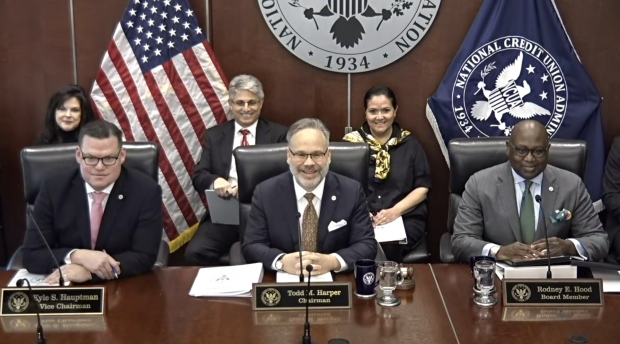 NCUA Board meeting, Nov. 16, 2023
NCUA Board meeting, Nov. 16, 2023
During Thursday’s NCUA Board meeting, members voted 3-0 to approve the final rule to amend the charitable donation accounts section adding “war veterans’ organizations” to the definition of a “qualified charity” that federal credit unions may contribute to with a charitable donation account.
According to the NCUA, the final rule “adds a post or organization of past or present members of the Armed Forces of the United States, or an auxiliary unit or society of, or a trust or foundation for, any such post or organization recognized as exempt from taxation under section 501(c)(19) of the Internal Revenue Code to the definition of a ‘qualified charity’ that a federal credit union may contribute to using a charitable donation account.” Of note, “qualified charity” is a section 501(c)(3) entity defined by the Internal Revenue Code and must be both a non-profit and organized for a charitable purpose.
NCUA Board Chair Todd Harper said, “With this final rule, the NCUA is taking an important step in honoring our nation’s many veterans. The rule is good for veterans, good for military families, good for credit union members, good for credit unions and good for our country. And, it fits nicely within the credit union ethos of people helping people.”
Credit union trade groups have fully supported the final rule.
In a statement, CUNA Deputy Chief Advocacy Officer for Regulatory Affairs Alexander Monterrubi said, “This final rule means many worthy tax-exempt organizations that serve veterans can now receive support from credit unions. We appreciate NCUA responding to our engagement on the need for this rule, which was based on direct feedback from our member credit unions — this is a great example of collaboration between the industry and agency that results in better outcomes for consumers.”
The final rule will go into effect 30 days after publication in the Federal Register.
Credit Unions - Invest in a Charitable Donation Account (CDA)
In December of 2013, the NCUA Board approved a final rule giving credit unions expanded investment powers to fund charitable donations, to organizations like NCOFCU, through investment returns rather than as an expense. Today, credit unions have invested more than 700mm in Charitable Donation Accounts (CDAs).
Credit Unions make our communities stronger, But in an effort to do more, now more than ever, credit unions are faced with the unique challenge of how to best fund your charitable giving focus while remaining responsible and accountable to your members. CDAs allow credit unions to make more so they can give more.
Download our CDA brochure to learn more
For additional information, please visit https://memberstrust.com/credit-unions/institutional-investments/charitable-donation-accounts/ or contact:
Jason Ritzenthaler, CFA, CTFA
Co-Chief Investment Officer
Director of Investments & Institutional Business
p: 813.386.8705
f: 813.631.9898
e: jason.ritzenthaler@memberstrust.com
www.memberstrust.com
Main Street values. Wall Street expertise.TM
*The National Coalition of Firefighters Credit Unions, Inc. (NCOFCU) is a non-profit, 501(c) (3) charitable organization. Donors may deduct contributions as provided in IRC 170(c) (3) of the U.S. Tax Code. Employer Identification Number 27-2387106
In December of 2013, the NCUA Board approved a final rule giving credit unions expanded investment powers to fund charitable donations, to organizations like NCOFCU, through investment returns rather than as an expense. Today, credit unions have invested more than 700mm in Charitable Donation Accounts (CDAs).
Credit Unions make our communities stronger, But in an effort to do more, now more than ever, credit unions are faced with the unique challenge of how to best fund your charitable giving focus while remaining responsible and accountable to your members. CDAs allow credit unions to make more so they can give more.
Download our CDA brochure to learn more
For additional information, please visit https://memberstrust.com/credit-unions/institutional-investments/charitable-donation-accounts/ or contact:
Jason Ritzenthaler, CFA, CTFA
Co-Chief Investment Officer
Director of Investments & Institutional Business
p: 813.386.8705
f: 813.631.9898
e: jason.ritzenthaler@memberstrust.com
www.memberstrust.com
Main Street values. Wall Street expertise.TM
*The National Coalition of Firefighters Credit Unions, Inc. (NCOFCU) is a non-profit, 501(c) (3) charitable organization. Donors may deduct contributions as provided in IRC 170(c) (3) of the U.S. Tax Code. Employer Identification Number 27-2387106
Comments
Post a Comment
Please no profanity or political comments.